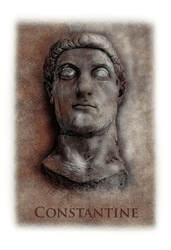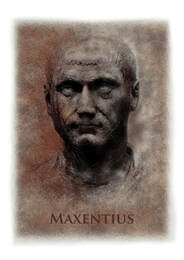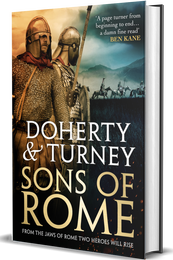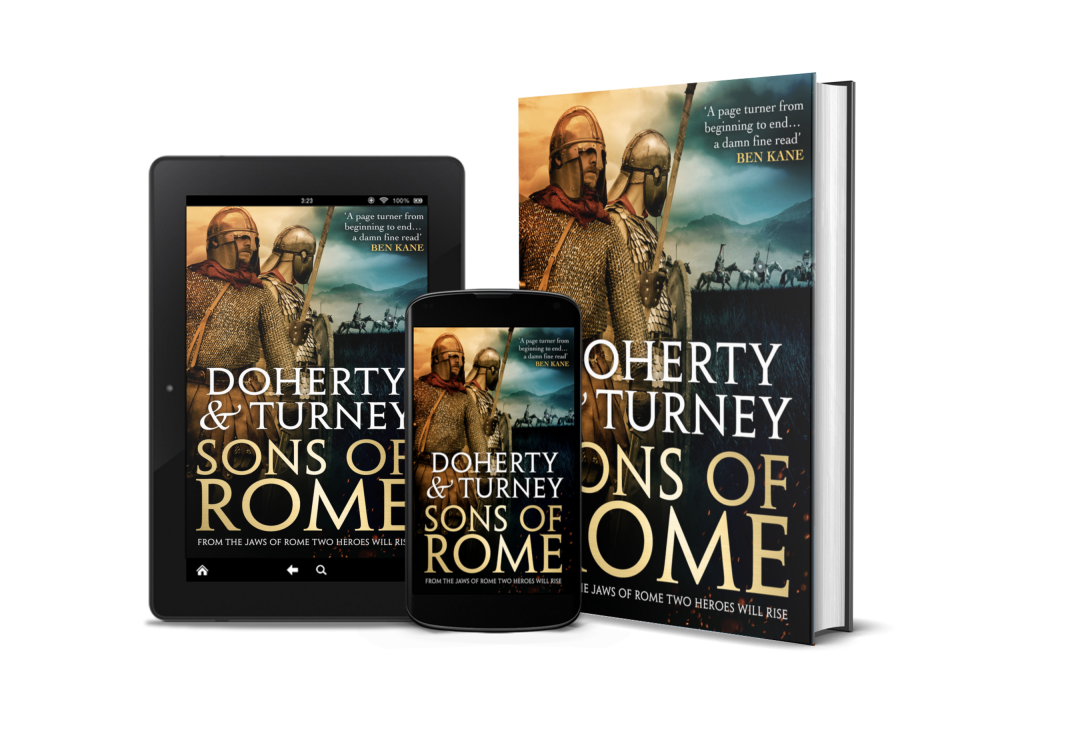Rise of Emperors: Sons of Rome - The Prologue
The Road to Rome, 27th October 312 AD

It was the eve of the battle that would come to define us: not just my kin, nor my empire – that great and ancient empire that sprung from the very city upon which I was poised to march – but nigh-on every soul on this mortal realm. And forever when they spoke of it they would whisper my name:
Constantine.
A clement breeze furrowed my greying locks as I looked south along the Via Flaminia – the road that would take me to my goal. Either side of the great highway, my loyal legions were camped: a sea of goatskin tents, bright banners, honed blades and polished helms glinting in the languid orange light of the late afternoon sun. A soldier knows that the eve of any battle is charged with emotions that take a man closer to his god, but that day, something occurred which, some say, instead brought the divine before me.
When it happened, the cornflower sky was unblemished with cloud, so it was no surprise that all within my ranks saw it: a bright, radiant halo that burst into life around the sun; a crescendo of light that briefly illuminated the land as if it were noonday once more. I shielded my eyes to the glare, heard my legionaries gasp, the thud of their knees hitting the ground, the cantillating songs of fused faiths rising in awe. Within a few heartbeats it was gone.
Men still speak of what happened there. Some talk of that nimbate sun as a vision bestowed upon me to guide me in battle the next day. Others claim I conjured the story of the lights to mask my flinty and insatiable ambition. Every soul doubtless has a theory on this and my many other endeavours, and what is a man but the sum of his deeds?
Well let me be the one to tell you of my deeds, both light and dark. What happened that afternoon on the road to Rome was neither an omen from the divine, nor a shrewd yarn to disguise mortal ambition: it was a moment of great realisation, and the culmination of a journey.
Now every journey has a story, but this one is a truly dark and tangled tale – one that would end, the very next day, in battle against my oldest friend…
Constantine.
A clement breeze furrowed my greying locks as I looked south along the Via Flaminia – the road that would take me to my goal. Either side of the great highway, my loyal legions were camped: a sea of goatskin tents, bright banners, honed blades and polished helms glinting in the languid orange light of the late afternoon sun. A soldier knows that the eve of any battle is charged with emotions that take a man closer to his god, but that day, something occurred which, some say, instead brought the divine before me.
When it happened, the cornflower sky was unblemished with cloud, so it was no surprise that all within my ranks saw it: a bright, radiant halo that burst into life around the sun; a crescendo of light that briefly illuminated the land as if it were noonday once more. I shielded my eyes to the glare, heard my legionaries gasp, the thud of their knees hitting the ground, the cantillating songs of fused faiths rising in awe. Within a few heartbeats it was gone.
Men still speak of what happened there. Some talk of that nimbate sun as a vision bestowed upon me to guide me in battle the next day. Others claim I conjured the story of the lights to mask my flinty and insatiable ambition. Every soul doubtless has a theory on this and my many other endeavours, and what is a man but the sum of his deeds?
Well let me be the one to tell you of my deeds, both light and dark. What happened that afternoon on the road to Rome was neither an omen from the divine, nor a shrewd yarn to disguise mortal ambition: it was a moment of great realisation, and the culmination of a journey.
Now every journey has a story, but this one is a truly dark and tangled tale – one that would end, the very next day, in battle against my oldest friend…
***
By the Milvian Bridge across the Tiber, the next day

Off to the left a centurion screamed imprecations at his men, driving them on across the churned turf and into the press of battle, while the clash and clamour of Rome’s armies at war filled the air around us.
I had to pause to adjust my rich wool hat, for it had become so sweat-sodden that it constantly threatened to slip down across my eyes, and it doesn’t do for an emperor to be cursing and blind as he fights for his throne. In the searing heat of the sun’s glaring fiery orb, my horse stank of sweat and my purple cloak clung damp to my back, sticking to the beast’s rump behind me.
My sword had become heavy in my hand. I’d had only a brief chance to use it that morning, when I had managed to slip my over-protective bodyguard and join the cavalry in a brief push. But I had waved it around enthusiastically from time to time, giving orders to charge here and hold there. I knew my histories. Julius Caesar’s men would have followed him into the jaws of Cerberus himself just because of that great general’s presence on the field.
And I, Maxentius, emperor of Rome, had to be a new Julius Caesar this day, or I would be no one.
Briefly, across the sea of glinting helms and the forest of spear points, I caught sight of him. My enemy. The man who would wrest Rome from me. Constantine. My brother, my oldest friend, and yet my last and most bitter adversary. Like a hero of ancient myth, he rose in his saddle, sword rising and falling in a constant spray of blood.
The force I had in the field vastly outnumbered that of my old friend and there, at the centre, not far from my brother on his war horse, I could see Volusianus and his Praetorians, pressing home our attack, assuring our victory. Five thousand men clad in high- quality steel, their shields bearing the proud scorpion insignia of the guardGuard , heaved forward against Constantine’s simple, chain-clad veterans, the enemies’ shields invested with a bright new design as if it might ward off a Praetorian blade.
It was almost over. Half a day’s fighting.
They had told me to stay in the city and prepare for a siege, but I could not. The time had come for confrontation. Even the Sibylline oracle had urged for this. Volusianus was close to Constantine now. Might my prefect even kill my old friend for me? Constantine lunged and withdrew – I could not make out his foe at this distance, but the way he lolled in the saddle suggested he had almost been skewered.
I had mixed feelings about that even now. Even here, at the end, when only he or I could leave this field as master of Rome, I could not have personally wielded the blade that took the life of my old friend. I was grateful to Volusianus for sparing me that pain.
How had it come to this? How had we ended our time together in this world here, each determined to witness the other’s demise before the sun set? A friendship so close that its collapse tears at the soul must have deep, strong roots.
I barely flinched, impassive, as a lucky stray bolt from one of Constantine’s artillery snatched a prefect from his saddle mere paces from me, hurling him back over his horse’s rear with a shriek and into the dust.
So much death…
But once, long ago, things were different. My brother and I had been young and innocent.
Once, the world was innocent.
I had to pause to adjust my rich wool hat, for it had become so sweat-sodden that it constantly threatened to slip down across my eyes, and it doesn’t do for an emperor to be cursing and blind as he fights for his throne. In the searing heat of the sun’s glaring fiery orb, my horse stank of sweat and my purple cloak clung damp to my back, sticking to the beast’s rump behind me.
My sword had become heavy in my hand. I’d had only a brief chance to use it that morning, when I had managed to slip my over-protective bodyguard and join the cavalry in a brief push. But I had waved it around enthusiastically from time to time, giving orders to charge here and hold there. I knew my histories. Julius Caesar’s men would have followed him into the jaws of Cerberus himself just because of that great general’s presence on the field.
And I, Maxentius, emperor of Rome, had to be a new Julius Caesar this day, or I would be no one.
Briefly, across the sea of glinting helms and the forest of spear points, I caught sight of him. My enemy. The man who would wrest Rome from me. Constantine. My brother, my oldest friend, and yet my last and most bitter adversary. Like a hero of ancient myth, he rose in his saddle, sword rising and falling in a constant spray of blood.
The force I had in the field vastly outnumbered that of my old friend and there, at the centre, not far from my brother on his war horse, I could see Volusianus and his Praetorians, pressing home our attack, assuring our victory. Five thousand men clad in high- quality steel, their shields bearing the proud scorpion insignia of the guardGuard , heaved forward against Constantine’s simple, chain-clad veterans, the enemies’ shields invested with a bright new design as if it might ward off a Praetorian blade.
It was almost over. Half a day’s fighting.
They had told me to stay in the city and prepare for a siege, but I could not. The time had come for confrontation. Even the Sibylline oracle had urged for this. Volusianus was close to Constantine now. Might my prefect even kill my old friend for me? Constantine lunged and withdrew – I could not make out his foe at this distance, but the way he lolled in the saddle suggested he had almost been skewered.
I had mixed feelings about that even now. Even here, at the end, when only he or I could leave this field as master of Rome, I could not have personally wielded the blade that took the life of my old friend. I was grateful to Volusianus for sparing me that pain.
How had it come to this? How had we ended our time together in this world here, each determined to witness the other’s demise before the sun set? A friendship so close that its collapse tears at the soul must have deep, strong roots.
I barely flinched, impassive, as a lucky stray bolt from one of Constantine’s artillery snatched a prefect from his saddle mere paces from me, hurling him back over his horse’s rear with a shriek and into the dust.
So much death…
But once, long ago, things were different. My brother and I had been young and innocent.
Once, the world was innocent.

